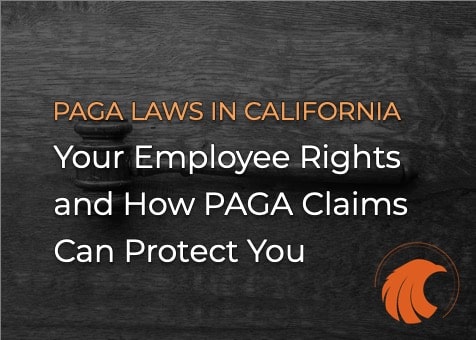PAGA, or the Private Attorneys General Act allows an employee to file a claim against their employer if the employer violated employment law

What is PAGA? That’s a common question that employees and employers have.
We’ll discuss PAGA in-depth here.
Who Does PAGA Cover?
Under PAGA, an “aggrieved” employee—who is defined as any current or former worker subjected to one or more of the alleged employment violations—has the authority to sue their employer for Labor Code violations.
Prior to 2004, when the legislation was enacted, only a state agency could bring a law enforcement action.
PAGA’s Penalty Provisions
Each initial PAGA violation is subject to a $100 penalty per pay period for each affected employee.
If the employer has previously violated the same code provision, they are subject to a $200 fine per violation.
Due to the addictive nature of the penalties, there is a high risk of massive financial liability for an employer if a PAGA lawsuit emerges.
Of the fines collected, 25% of the civil penalties recovered to go to the employee(s), who may also recover attorney fees and court filing costs.
75% of the recovery amount is distributed to California’s Labor and Workforce Development Agency to help with labor-law enforcement and to educate employers and employees about their rights and responsibilities under state law.
WRLG Attorneys Take Employment Law Cases on a Contingency Fee Basis
If you feel that you have been mistreated by your employer than you should hire an attorney that will go over your case on a contingency fee. At WRLG our attorneys represent workers on a contingency fee basis. This means that we get paid only if we recover money for you. We invite you to contact our firm today to find out whether you have a valid claim.
Topics Related to PAGA Claims
Check out our law library for other areas regarding PAGA claims:
- Why California’s “Bounty Hunter” Law is Dangerous for Employers Settlement of PAGA Cases
- PAGA Lawsuits—Important Information Every Employee Needs to Know
What is PAGA’s Scope?
PAGA applies to many different violations under the California Labor Code, including:
- Failing to provide itemized wage statements;
- Terminating an employee while they are out on leave;
- Failing to provide suitable seating if it’s requested;
- Failing to pay overtime;
- Misclassifying an employee as an independent contractor;
- Improperly rounding hours;
- Failing to provide mandatory meal and rest breaks;
- Failing to pay minimum wages and/or overtime premiums;
- Not reimbursing an employee’s reasonable business expenses;
- Failing to make timely wage payments;
- Not including bonuses and other forms of compensation in a regular pay rate for purposes of calculating overtime compensation; and
- Making health and safety legal missteps.
This is not, however, an exhaustive list.
The reality is that practically any employment claim may be brought under PAGA.
Lawsuits under the Private Attorneys General Act have the potential to lead to high payouts.
For instance, in 2018, Wal-Mart settled a PAGA lawsuit for $65 million on claims it failed to provide cashiers with suitable seating when they requested that accommodation.
PAGA is undeniably a pro-employee statute.
For instance, employment agreements that restrict employees from filing class-action lawsuits or require them to arbitrate employment disputes are not enforceable under PAGA.
Also, courts have found that language explicitly waiving an employee’s right to file a PAGA claim violates public policy and therefore is not enforceable.
The bottom line: PAGA claims can be a streamlined way to hold employers accountable for wrongdoing, but there are particular notices and other procedural requirements to meet before an employee can file suit.
Turn to an Attorney for Answers on PAGA
The employment attorneys at the Workplace Rights Law Group are available to address specific concerns arising from the “what is PAGA” question.
Contact our firm to set up a complimentary consultation to discuss any particular concerns you have about this important question.
